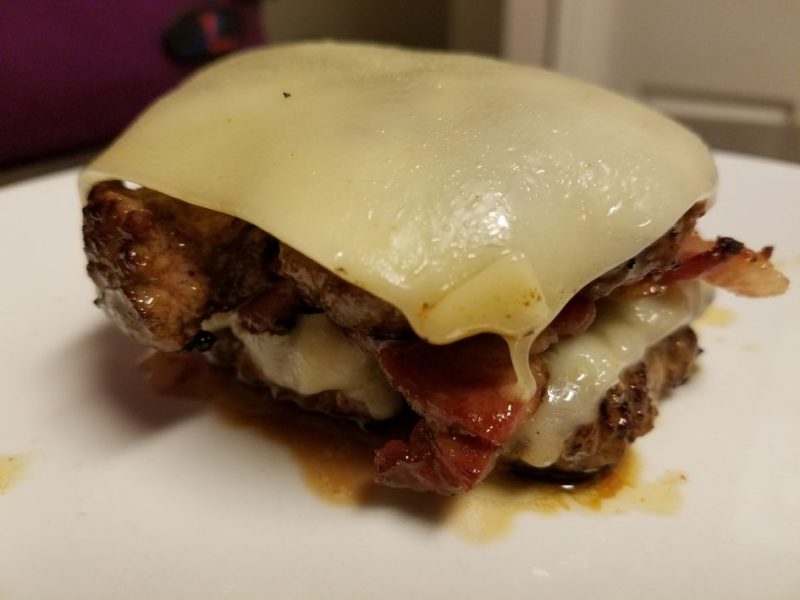The fact that I’ve had a nutrition blog for almost a year and managed to not write about the Keto diet surprises no one more than me. I get asked about it all the time. Does it work? Is the weight loss sustainable and healthy? Is it dangerous?
Keto diet in a nutshell
Your body’s first line source of energy is glucose, which comes from carbohydrates in the diet. However, if no carbohydrates are available, the liver will break down fat into ketones which can be used instead of glucose. Ketones are essentially our body’s back up plan. If you intentionally restrict carbohydrates, usually to less than 20 grams a day, this process takes over. The body is in ketosis when ketone levels are high and being utilized as the primary source of energy. This fat break down often results in significant weight loss.
Now, many people interchange the Keto diet with a “low carb diet”. The difference being in order to be in ketosis, you have to really restrict carbohydrates. It’s very difficult to eat less than 20 grams of carbohydrates a day. As I type I’m snacking on a cheese tray with Triscuit crackers, and the 6 crackers on my plate total 20 carbs. That would be my allotment for the entire day! Many people, when referring to the keto diet, are just talking about a low carb diet. This might mean striving for 50-75 grams of carbohydrates per day. But, this is still quite low in comparison to an average diet of 200-300 grams per day.
My Thoughts
I’ve been hesitant to share an opinion on the Keto diet because, to be honest, I’m not entirely sure where I stand. My goal is to always provide evidence-based information (aka knowledge we KNOW to be accurate or most likely true based on the best clinical research available) and stay away from fads and opinions. And the truth is, the research is all over the place on this one.
If I want to find studies that show health benefits and successful weight loss with the Keto diet, I can find them. If I want to find studies concluding it’s the worst diet on the planet, I can find them. I can find doctors, PhDs, and experts that love it and those who hate it. There’s tons of current research going on right now and I think more answers will come, which is good.
But for now, the only thing I know to do is provide my take on the available information, and let you make your own decision. What I’m sharing really applies to both diets (low carb and keto) because the controversy applies to both. So, let me share what I know.
I know that significant weight loss, especially for those with a lot of weight to lose, is undeniable. I’ve seen countless patients and individuals lose a lot of weight doing this when nothing else has ever worked for them. Most weight loss transformation stories where people have lost >100 pounds has been from following a very low carb diet. So if weight loss is your only goal, it’s probably going to be effective. That doesn’t mean it’s easy to follow, but it is effective.
If it’s effective for weight loss, then two important follow-up questions to ask are 1) Is the weight loss sustainable and, more importantly, 2) Is it causing harm?
The issues
That’s where the debate comes in. And where the research is polarizing. To easily follow a high fat, low carb diet, people will often limit fruits and vegetables, certainly any grains, and eat lots of meat and animal products. Which means it’s difficult to get the amount of fiber, certain nutrients, and antioxidants we know are good for our long term health. Does the benefit from losing fat mass and visceral fat (the bad kind) outweigh the negative effects of eliminating foods we know have other important benefits? I’m not sure we have enough information at this time to say.
The low carb/keto diet can be hard to follow, and subsequently difficult to maintain as a lifestyle. And we know if it’s not something you can sustain as a lifestyle, the results probably aren’t going to be sustainable either. I’ve watched many people lose weight restricting carbohydrates but also observed quite a few of them gain the weight back (and some) when they stopped following it.
There’s currently a study underway where subjects are put on a very low carbohydrate diet for a while, then transitioned to a Mediterranean lifestyle which focuses on fruits, vegetables, healthy fats, nuts, legumes, whole grains and fish, moderate amounts of dairy and wine, and low consumption of meat. The Mediterranean diet is well-documented in the research to be healthy and prevent chronic diseases. The purpose of the study is to see if subjects are able to lose weight on a very low carb diet and keep it off following the Mediterranean lifestyle long term. I think it’s an interesting approach and one that may address the sustainability issue.
How I approach Keto
So what do I do in practice? If someone tells me they want to try the ketogenic diet, I don’t discourage them. I coach them through questions about it. I’m honest with them about the limitations of our knowledge. And I follow up with them closely to see if it’s effective and if any of their biometrics are affected. I have definitely seen some successes, where people have lost weight and their health markers like cholesterol and blood pressure have improved.
Enough studies have shown that eating low carb diets which include healthy choices like fruits, vegetables, healthy fats and proteins from plant products may be good for our long term health. Almost all of us eat too many carbs in the form of added sugar and refined carbohydrates. Cutting down on sodas, treats, and double portions of pasta is going to lower our carbohydrate intake while leaving PLENTY of room for nourishing fruits and vegetables. If we were to mostly eat fruits, vegetables, healthy fats, and lean meats, our carbohydrate intake would probably tank to a level that doesn’t “starve” us into ketosis but that allows our body to drop some excess weight if it’s there.
I recommend instead of eating this:

Try eating this:

Both are low carb/keto friendly, with the first following the “bacon on everything!” keto stereotype. The second picture is a healthy low carb meal with a variety of nutrients, protein, healthy fat and the carbs come from berries. This is a meal everyone can and should enjoy!
I personally follow a low-carb lifestyle and it has worked for me. I do eat grains, but not in large quantities and almost exclusively whole grains.
This really just touches the iceberg on this topic. I could write (and maybe I will) TONS more on this subject. But for now, I hope this helps. Let me know what you think. Have you followed a low carbohydrate lifestyle or diet before? What was your experience?





